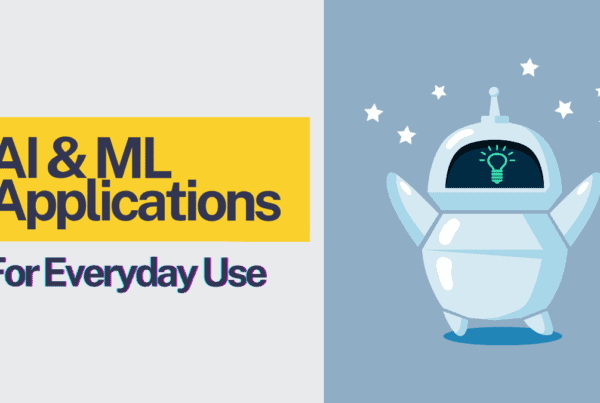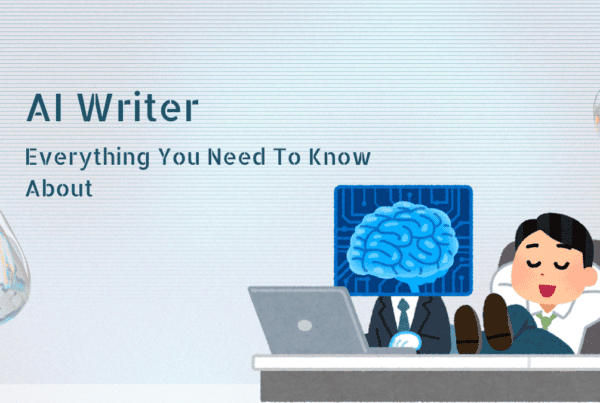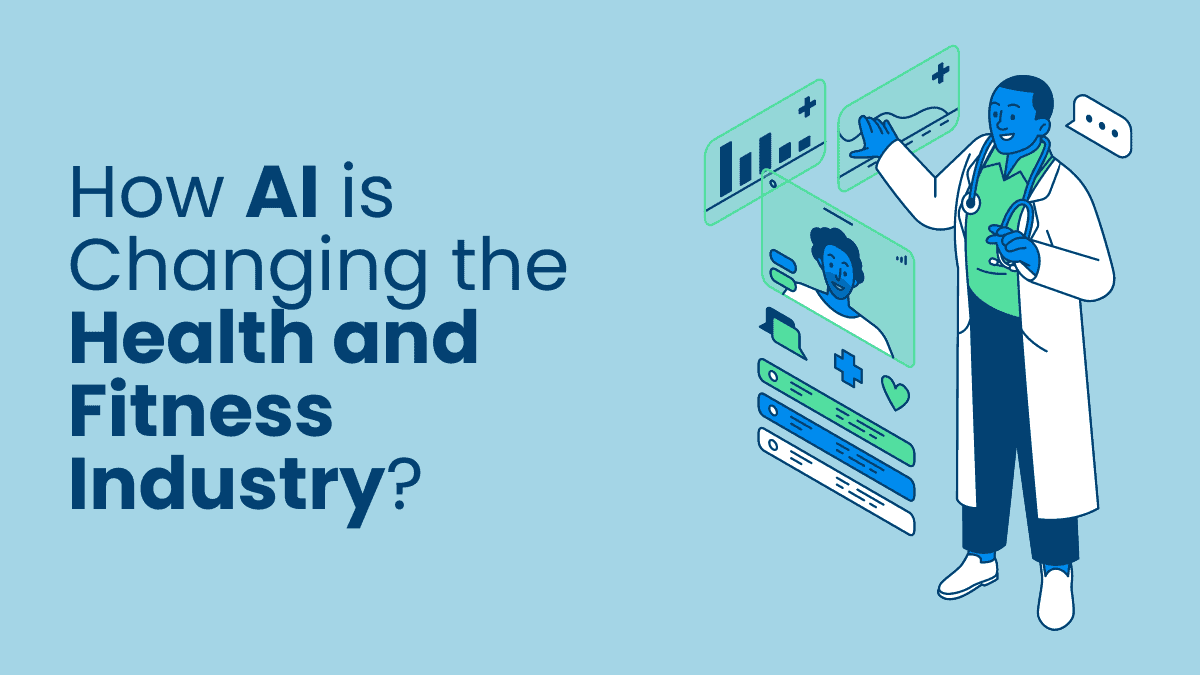
Artificial Intelligence (AI) is changing how different industries work by quickly learning and adapting to tasks.
In the automotive industry, AI is making self-driving vehicles and helping with efficient supply chain management. The energy field uses AI to predict when infrastructure needs maintenance and to use energy more wisely. In banking, AI is used to find and stop fraud, manage risks, and offer customized services to customers. The retail industry is using AI to handle their inventory better, create personalized ads, and make shopping more enjoyable for customers. In agriculture, AI helps monitor the health of crops and soil, predict the weather’s impact, and automate tasks on the farm.
Similarly, in the healthcare sector, AI is changing how we do things in the health and fitness world. It’s not just for big industries—it’s making a big difference in our personal health too! Whether it’s giving us personalized workout tips or helping doctors with advanced health checks, AI is shaking things up. Let’s look at the top 10 cool ways AI is making waves in health and fitness, from stuff that benefits us directly to high-tech advancements in healthcare.
10 Ways AI is Transforming the Healthcare and Fitness Industry
AI is changing how we stay healthy with modern-day solutions like fitness gadgets and virtual health helpers. Check out the top 10 ways AI is making a difference in the health and fitness world.
Personalized Wellness Solutions
AI is changing the fitness game by making personalized workout plans. This means your exercise routine is made just for you, considering your goals, how fit you are, and what you like.
Apps like Fitbit, MyFitnessPal, and Athletica use special computer programs (algorithms) to look at your info and suggest workouts and diet plans. This personal touch helps you reach your fitness goals in a way that works best for you.
Take Athletica, for example. It’s a special program that uses AI to create a step-by-step training plan based on your abilities, schedule, and goals. It gives you a daily plan, analyzes your workouts, and adjusts your plan as needed. It even makes a special AI workout for races or specific fitness targets. It’s like having a personalized fitness coach just for you!
AI is changing how we stay healthy by making it all about you, not one-size-fits-all. It can cater to what you like and how your body works, creating workouts that fit your unique needs and shape.
So, when we talk about AI in personalized fitness, it’s about making fitness easier and better for you with a super personalized experience.
Dietary Support through AI
Apps like Nutrino and Lose It! are changing how we think about food with the help of AI. They look at what you eat, and then they give you personalized meal plans and tips to make healthier choices.
Nutrino acts like a smart nutritionist using AI. It answers your nutrition questions right away, gives personalized advice, and even comes up with meal recipes for you. It’s like having a nutritionist on your phone!
Lose It! is another app doing similar things with AI. It helps you track what you eat, set goals, and stay motivated. If you’re using the app and you write down what you eat, it can suggest healthier options to help you reach your goals.
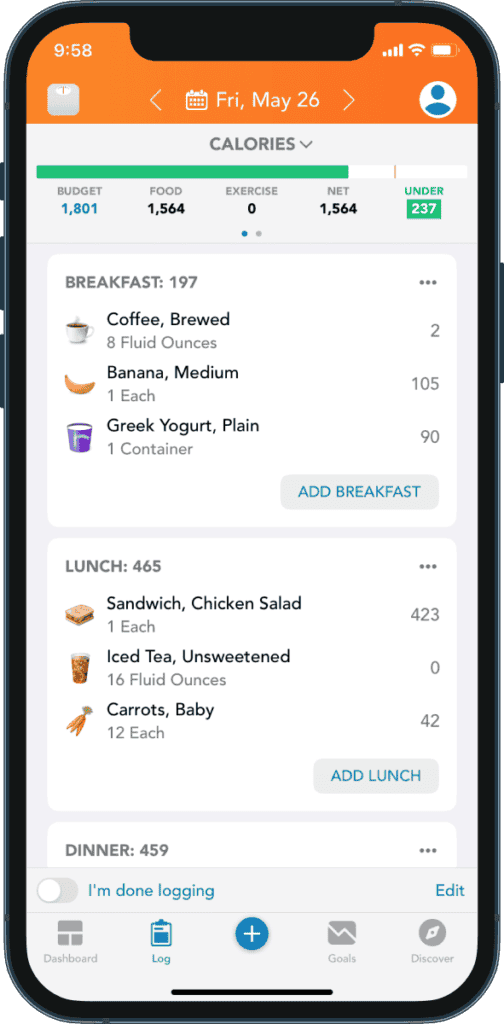
These apps use special computer programs (AI and machine learning) to figure out what you eat and your health goals. With all that info, they create meal plans and advice tailored to your needs and preferences. The goal is to make eating healthy easier and more personal for everyone.
Behavioral Support for Healthy Habits
Apps like Fabulous are changing how we get coaching for our habits with the help of AI. They use smart computer programs to understand how we act and then give us advice to build and keep healthy habits.
Fabulous, for example, started as a way to track habits but turned into a platform for self-improvement and coaching. It uses AI to give your life some structure, help you create good habits, focus better, and learn to be thankful. And when you use the app, it feels like you’re having a chat with Fabulous, not just a computer program.
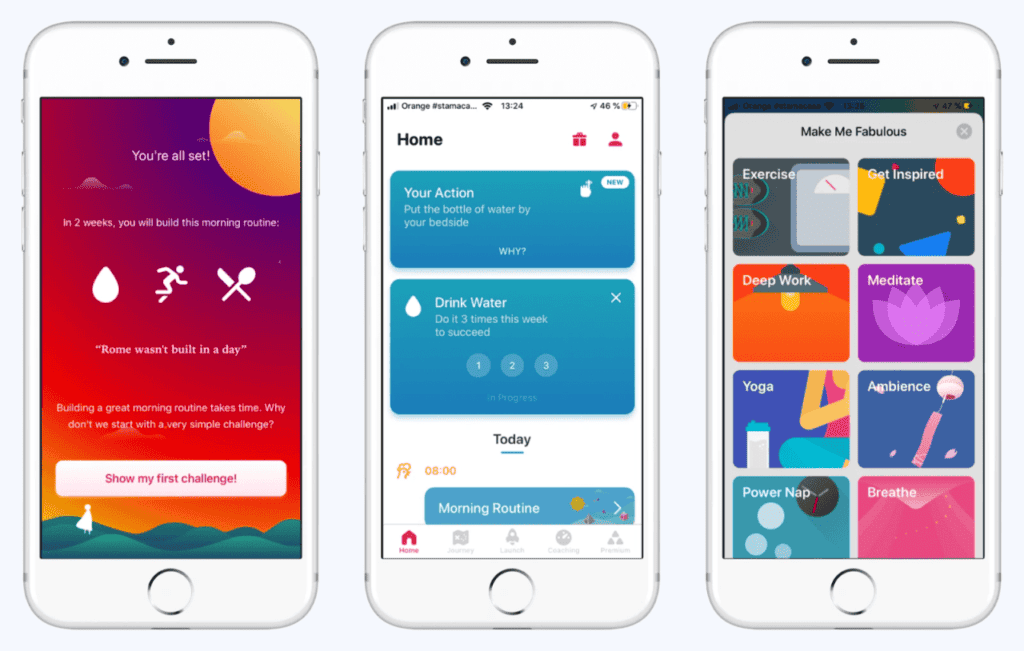
These apps look at info like what you usually do, your goals, details about your genes, etc. With all that, they make coaching sessions that fit what you need and how you learn. They also give feedback right away to help you get better quickly.
The main idea is to make coaching for better habits easier and more personal for everyone.
Proactive Healthcare with AI
AI in preventive healthcare is a fancy way of saying that computers are helping doctors and health systems keep an eye on people’s health to catch problems early. These computers use smart programs to look at a lot of medical info and figure out if there’s a risk of something bad happening.
For example, they can predict how groups of people might behave health-wise, so doctors can act before anyone gets sick. They use AI to look at past info about patients with chronic conditions like diabetes and asthma, then make predictions about what might happen in the future. The computer keeps learning and getting better at making predictions by looking at new info about patients.
The amazing thing is that these computers not only look at the medical aspect but also consider things like where you live and daily habits. This helps doctors give personalized advice that works better for each person. So, instead of waiting for a problem to happen, AI in preventive healthcare is about stopping issues before they become serious.
Virtual AI Healthcare Assistance
Virtual AI Healthcare Assistants (VHAs) like Ada Health (health companion app) and Your.MD (Healthily) are apps that use smart programs to assist people in taking care of their health and dealing with the healthcare system.
Ada Health is one of these helpers. It asks you questions about your health, checks them against a big list of medical database it have, and then gives you a report about what might be going on and what you could do next. It’s like having a smart friend who knows a lot about health.
Your.MD, is another one. It uses artificial intelligence (AI) to give you personalized health information through a chatbot. It helps with health advice and even gives suggestions for what to do when you can’t talk to a real doctor.
These apps are made to make it easier for people to get the health information they need. They aim to keep you engaged in taking care of your health, save money and time for doctors, and give you info that’s easy to understand and use. So, with these helpers, it’s like having a personal guide for your health journey.
AI in Disease Diagnosis
AI in tools that diagnose diseases, like IBM Watson for Oncology, is changing how doctors find out what’s wrong with patients. These tools use smart computer programs to look at a ton of medical parameters and help doctors give more accurate and quick diagnoses.
IBM Watson for Oncology is an example. It’s like a computer helper for cancer care. It assists doctors in quickly finding important info in a patient’s medical record, showing relevant articles, and suggesting treatment options. This helps keep the care consistent and gives doctors more time for their patients.
This tool learns from doctors at a top cancer center and uses a lot of medical info, like journals, textbooks, and treatment guidelines, to figure out the best options for a patient. So, the idea is to make diagnosing diseases more precise, faster, and personalized, helping doctors make good decisions about patient care.
Precision Medicine Advancements
AI in precision medicine is a quickly growing field that uses smart computer programs to look at a lot of medical info and help doctors give more accurate and quick disease diagnoses.
An example of this is Tempus, a tech company that’s using artificial intelligence to make precision medicine better. They have a huge library of medical data and a system to make that data useful. Tempus collects and studies data about molecules, clinical info, and genes using AI. They get this info from different types of medical centers. Then, they use this data to help doctors make real-time decisions for personalized care and specific treatments.
So, the idea of AI-driven precision medicine, like what Tempus does, is to create treatment plans that fit a person’s genes. This makes treatments more precise and effective, helping doctors decide the best care for each patient.
Robotic Innovations in Surgery
Robotic surgery, powered by AI, is changing how operations are done, and the da Vinci Surgical System is a big part of that change. This system is like a robot helper for surgeons, making surgeries more accurate, quicker, and better for patients.
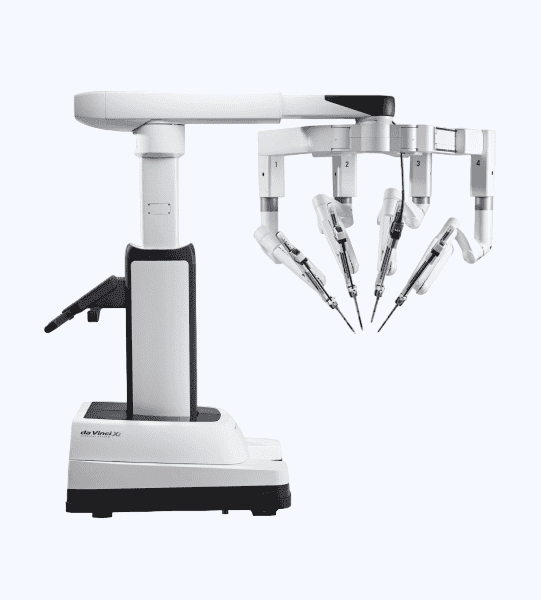
Made by a company called Intuitive Surgical, the da Vinci system is used for different surgeries like fixing heart valves, removing prostates, and doing gynecologic procedures. It’s special because it uses small cuts instead of big ones.
The da Vinci system has a console where the surgeon sits and controls the robotic arms. These arms hold surgical tools and cameras. The surgeon moves the console’s controls, and the robot arms mimic those movements in real time during the surgery. The robot arms can do things like cutting, sewing, and holding things with precision. The 3D cameras give the surgeon a super close and clear view of what they’re doing.
It has seen significant advancements over the years, particularly with the integration of artificial intelligence (AI) and machine learning (ML). Here are some key advancements:
- Digital Intelligence Integration: The da Vinci system has integrated digital intelligence into its robotic surgical systems and instruments. This development began more than 25 years ago when Intuitive put computer technology, what became known as the da Vinci standard system, between a surgeon and a patient.
- Training Surgeons: Intuitive has made strides in training surgeons through cloud-based learning content, remote case proctoring, simulation tools, and advancements in pre-operative planning. This approach complements the traditional “see one, do one, teach one” philosophy and could help increase the number of surgeons trained to use robotic systems for minimally invasive procedures.
- AI and ML in Surgical Planning: The incorporation of AI within the Da Vinci system enables advanced image analysis, surgical planning, and real-time adjustments based on the patient’s specific anatomy and physiology. These modifications ensure optimal surgical outcomes, improving patient experiences and recovery times.
- Da Vinci 5 Robotic Surgical System: The new Da Vinci 5 system is built to enable the future of AI and machine learning in surgery. With over 10,000x the computing power, the system will continue to evolve over time through software and enhanced capabilities. It also features Force Feedback technology that allows surgeons to sense force at the instrument tip.
- Machine Learning in Tactical Feedback: The da Vinci Standard Surgical System developed a recording and playback system to help trainees receive tactical feedback to acquire more precision when operating.
These advancements reflect Intuitive’s commitment to harnessing current and future innovations in robotics, AI, ML, and advanced visualization to address stressors facing surgeons, physicians, care teams, and the institutions where they practice.
AI-powered surgical robots, like the da Vinci System, help surgeons do their job better. These robots are like computer assistants during surgeries, handling tools and helping with precise movements. This makes surgeries more focused, efficient, and personalized, ultimately improving patient care.
AI in Chronic Disease Management
Livongo Health, Inc., founded in 2008, has revolutionized chronic disease management through the adept integration of artificial intelligence and data science into healthcare practices. By leveraging AI algorithms and real-time data from health monitoring devices, Livongo empowers patients suffering from chronic conditions such as diabetes, hypertension, and dyslipidemia to take proactive measures to manage their health effectively. The company’s innovative approach involves personalized feedback and support, akin to having a dedicated health coach available around the clock.
One of Livongo’s standout features is its ability to provide actionable insights derived from aggregated patient data, allowing for timely interventions to prevent health complications. For instance, individuals with diabetes receive immediate notifications via calls or text messages when their blood sugar levels deviate from the norm. This real-time feedback, coupled with access to Certified Diabetes Educators through the Livongo app, ensures that patients receive personalized guidance tailored to their specific health needs. Through the seamless integration of smart devices and expert assistance, Livongo fosters a supportive environment for individuals managing chronic diseases, thereby enhancing their overall quality of life.
The efficacy of Livongo’s AI-driven approach is underscored by research findings, such as those published in the Journal of Diabetes, showcasing significant improvements in health outcomes among program participants. With a focus on personalized care and continuous monitoring, Livongo epitomizes the transformative potential of artificial intelligence in healthcare, offering a beacon of hope for individuals navigating the complexities of chronic illness management.
AI Empowering Healthcare Professionals
AI-assisted doctors are like a big change in how healthcare works. These doctors use smart computer programs to get better at medicine, take care of patients, and manage their time well.
In the medical world, AI helps doctors by supporting them in clinics and research. The main jobs of AI in medicine are helping with treatment decisions and looking at medical images like MRIs or X-rays. For example, AI can be trained to notice signs of diseases in these images.
What’s cool is that AI in medicine uses something called “reinforcement learning.” It’s a way of teaching AI to make decisions. The goal is to make things easier for doctors and help them make better choices. This kind of technology isn’t just for medicine; it can be used in other fields where decisions need some help.
In simple words, AI-assisted doctors are here to make healthcare more exact, faster, and personalized. They help doctors make good decisions about how to care for patients.
This is just the start!
AI is changing the health and fitness world in big ways. It’s making personalized fitness plans, improving fitness gadgets, and helping with health issues. AI is also creating virtual health helpers, finding diseases early, making healthcare work better, and even helping with surgeries. It’s like a super-smart assistant for health.
And this is just the start! As AI gets even better, we can expect more cool things in health and fitness. The mix of technology and wellness is reshaping how we take care of ourselves and how doctors help us. The future is looking healthier and more high-tech, thanks to AI.


